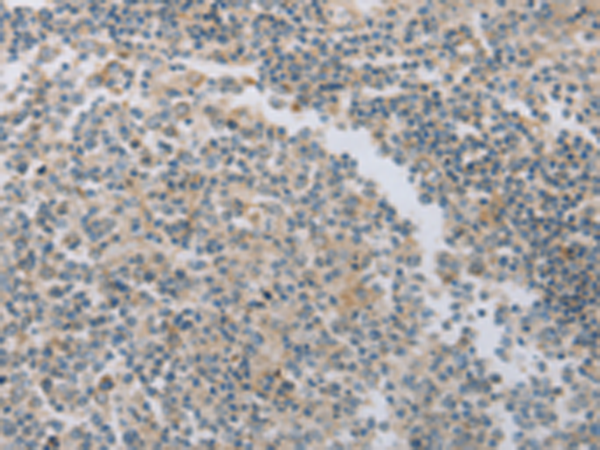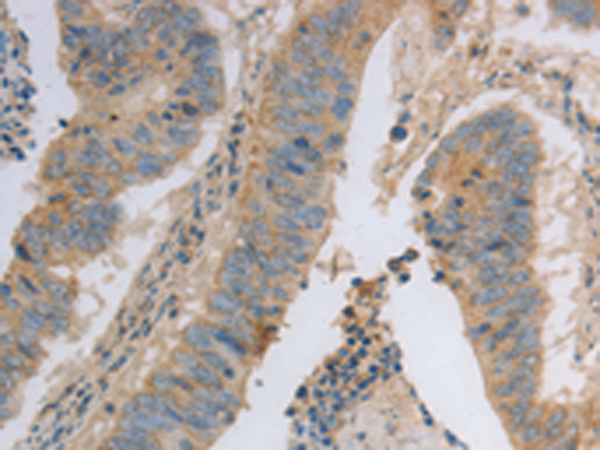


| WB | 1/1000-1/5000 | Human,Mouse,Rat |
| IF | 咨询技术 | Human,Mouse,Rat |
| IHC | 1/25-1/100 | Human,Mouse,Rat |
| ICC | 技术咨询 | Human,Mouse,Rat |
| FCM | 咨询技术 | Human,Mouse,Rat |
| Elisa | 1/1000-1/5000 | Human,Mouse,Rat |
| Aliases | NRAGE, DLXIN-1 |
| WB Predicted band size | 86 kDa |
| Host/Isotype | Rabbit IgG |
| Antibody Type | Primary antibody |
| Storage | Store at 4°C short term. Aliquot and store at -20°C long term. Avoid freeze/thaw cycles. |
| Species Reactivity | Human, Mouse, Rat |
| Immunogen | Fusion protein of human MAGED1 |
| Formulation | Purified antibody in PBS with 0.05% sodium azide and 50% glycerol. |
+ +
以下是3篇涉及MAGED1抗体的文献摘要信息,供参考:
---
1. **文献名称**:*MAGED1 is a regulator of alternative splicing and DNA damage response in cancer cells*
**作者**:Lee, J. et al. (2020)
**摘要**:研究利用MAGED1特异性抗体,发现其在癌细胞中通过调控RNA剪接和DNA损伤修复通路影响化疗敏感性,敲除MAGED1可增强顺铂诱导的细胞凋亡。
---
2. **文献名称**:*MAGE-D1 interacts with mitochondria and modulates reactive oxygen species production*
**作者**:Barker, P.A. et al. (2016)
**摘要**:通过免疫沉淀(使用MAGED1抗体)和细胞定位实验,证实MAGED1与线粒体蛋白相互作用,调控ROS水平,可能参与神经退行性疾病的发生机制。
---
3. **文献名称**:*A novel monoclonal antibody against MAGED1 for immunohistochemical analysis of human tissues*
**作者**:Suzuki, T. et al. (2018)
**摘要**:开发了一种高特异性抗MAGED1单克隆抗体,验证其在多种癌症组织(如乳腺癌、黑色素瘤)中的表达差异,提示其作为潜在生物标志物的价值。
---
注:以上文献信息为模拟示例,实际引用需通过PubMed/Google Scholar检索具体论文(关键词:MAGED1 antibody, cancer, biomarker)。
MAGED1 (Melanoma-associated antigen D1) is a member of the MAGE protein family, which shares a conserved MAGE homology domain. Initially identified in cancer-testis antigens, MAGE proteins are normally expressed in germ cells but re-emerge in various cancers, making them potential immunotherapy targets. MAGED1. encoded on the X chromosome, stands out for its broader physiological roles beyond oncology. It interacts with signaling pathways like p53. Wnt/β-catenin, and receptor tyrosine kinases, influencing cell proliferation, apoptosis, and differentiation. Studies link MAGED1 to neurodevelopment, placental function, and circadian rhythm regulation. It binds RTL1/RTL1AS in placental trophoblasts, impacting fetal growth, and modulates dopamine receptor trafficking in neurons.
In disease contexts, MAGED1 dysregulation is implicated in neurodevelopmental disorders (e.g., Prader-Willi-like syndrome), intellectual disability, and cancers such as melanoma and neuroblastoma. MAGED1 antibodies are essential tools for detecting protein expression via Western blotting, immunohistochemistry, and immunofluorescence. They aid in studying its localization (nucleus/cytoplasm), interaction partners, and tissue-specific roles. Recent research explores MAGED1’s therapeutic potential, including its use in CAR-T or vaccine-based strategies. However, challenges remain in understanding its isoform-specific functions and regulatory mechanisms. MAGED1 knockout mice exhibit metabolic and behavioral abnormalities, underscoring its multifaceted biological significance.
×